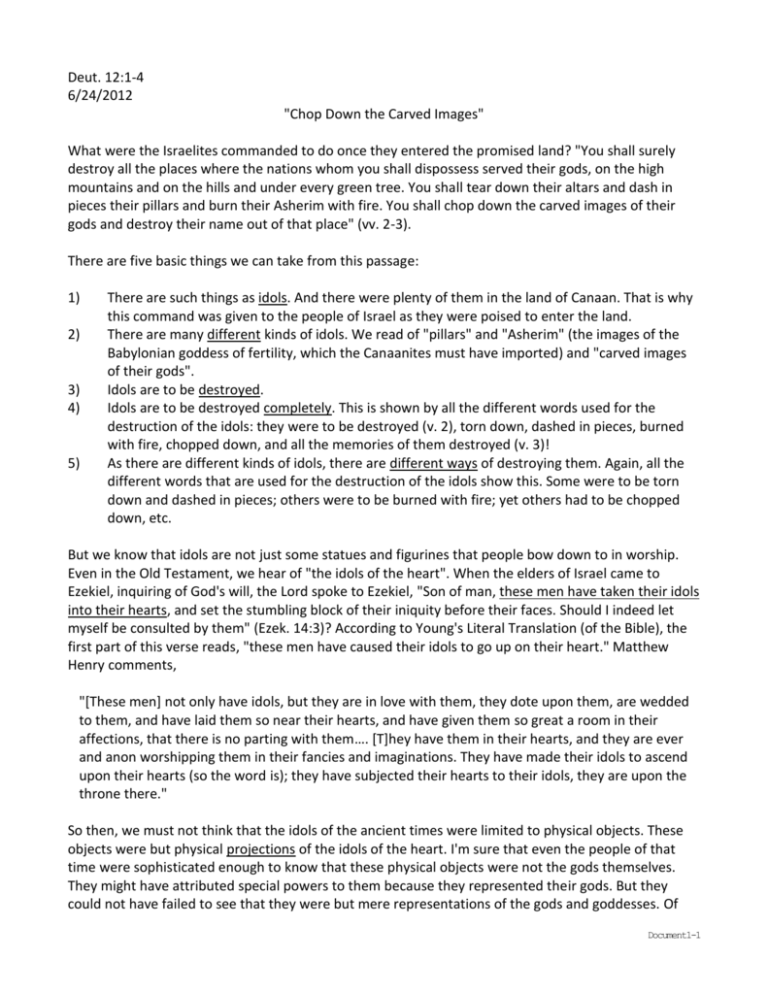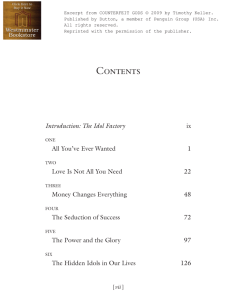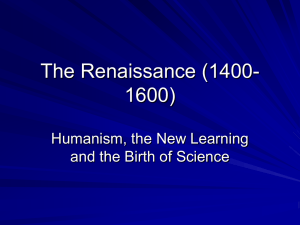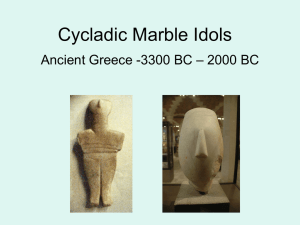
Deut. 12:1-4
6/24/2012
"Chop Down the Carved Images"
What were the Israelites commanded to do once they entered the promised land? "You shall surely
destroy all the places where the nations whom you shall dispossess served their gods, on the high
mountains and on the hills and under every green tree. You shall tear down their altars and dash in
pieces their pillars and burn their Asherim with fire. You shall chop down the carved images of their
gods and destroy their name out of that place" (vv. 2-3).
There are five basic things we can take from this passage:
1)
2)
3)
4)
5)
There are such things as idols. And there were plenty of them in the land of Canaan. That is why
this command was given to the people of Israel as they were poised to enter the land.
There are many different kinds of idols. We read of "pillars" and "Asherim" (the images of the
Babylonian goddess of fertility, which the Canaanites must have imported) and "carved images
of their gods".
Idols are to be destroyed.
Idols are to be destroyed completely. This is shown by all the different words used for the
destruction of the idols: they were to be destroyed (v. 2), torn down, dashed in pieces, burned
with fire, chopped down, and all the memories of them destroyed (v. 3)!
As there are different kinds of idols, there are different ways of destroying them. Again, all the
different words that are used for the destruction of the idols show this. Some were to be torn
down and dashed in pieces; others were to be burned with fire; yet others had to be chopped
down, etc.
But we know that idols are not just some statues and figurines that people bow down to in worship.
Even in the Old Testament, we hear of "the idols of the heart". When the elders of Israel came to
Ezekiel, inquiring of God's will, the Lord spoke to Ezekiel, "Son of man, these men have taken their idols
into their hearts, and set the stumbling block of their iniquity before their faces. Should I indeed let
myself be consulted by them" (Ezek. 14:3)? According to Young's Literal Translation (of the Bible), the
first part of this verse reads, "these men have caused their idols to go up on their heart." Matthew
Henry comments,
"[These men] not only have idols, but they are in love with them, they dote upon them, are wedded
to them, and have laid them so near their hearts, and have given them so great a room in their
affections, that there is no parting with them…. [T]hey have them in their hearts, and they are ever
and anon worshipping them in their fancies and imaginations. They have made their idols to ascend
upon their hearts (so the word is); they have subjected their hearts to their idols, they are upon the
throne there."
So then, we must not think that the idols of the ancient times were limited to physical objects. These
objects were but physical projections of the idols of the heart. I'm sure that even the people of that
time were sophisticated enough to know that these physical objects were not the gods themselves.
They might have attributed special powers to them because they represented their gods. But they
could not have failed to see that they were but mere representations of the gods and goddesses. Of
Document1-1
course, the gods and goddesses they represented did not exist. They were false. They were nonexistent entities, only figments of people's imagination. But what they sprang from was real--the fallen
man's lust for fertility, prosperity, power, health, long life, safety, or pleasure.
But what is wrong with wanting those things? They are not bad things, are they? Of course not! They
are not bad in and of themselves. In fact, they should be considered God's gracious gifts to man! Then,
why are they called idols and why should they be destroyed? C.S. Lewis provides a keen insight on this
point:
"There is but one good; that is God. Everything else is good when it looks to Him and bad when it
turns from Him. And the higher and mightier it is in the natural order, the more demoniac it will be if
it rebels. It's not out of bad mice or bad fleas you make demons, but out of bad archangels. The false
religion of lust is baser than the false religion of mother-love or patriotism or art: but lust is less likely
to be made into a religion" (C.S. Lewis, Great Divorce, pp. 97-98).
What makes these "good things" into "bad idols"? C.S. Lewis suggests a clear, easy answer: whenever
something--it is usually something good but it can also be something "bad"--[whenever something]
draws us away from our ultimate allegiance to God and hinders us from obeying Him, it has become
an idol. Tim Keller speaks of the relationship between idolatry and sin in this way: "Sin isn’t only doing
bad things, it is more fundamentally making good things into ultimate things. Sin is building your life
and meaning on anything, even a very good thing, more than on God. Whatever we build our life on
will drive us and enslave us. Sin is primarily idolatry" (Tim Keller,
http://www.monergism.com/postmodernidols.html).
It is clear that idols are bad. They are bad because they cause us to look away from God and search in
things other than God the ground of our true happiness and fulfillment and self-worth. Anything that
causes us to look away from God is bad 1) because God is the ultimate Good; 2) because other things
cannot deliver. This is exactly what the Lord says in Jer. 2:13: "my people have committed two evils:
they have forsaken me, the fountain of living waters, and hewed out cisterns for themselves, broken
cisterns that can hold no water."
Idols are bad because they cause us to turn away from God, who is the ultimate Good, "the fountain of
living waters". Even the good things in this world--and, for that matter, even the greatest and the best
that this world can offer--are but "broken cisterns that can hold no water." Here, we are not simply
saying that God is better and greater than anything else. We are also saying that God, being the
ultimate Good, is who makes anything truly good.
Of course, if anything is good, it is because God made it good in the first place. But its true goodness
does not lie in its inherent beauty or glory, which gives us pleasure and delight. Its true goodness lies in
declaring the glory of God, pointing us to the power, wisdom, beauty, and majesty of the Creator, the
Fountain of living waters!
The problem is that the good things we experience and enjoy in this life are so good, flowing as they
are from the infinite goodness and generosity of God. Think of the breathtaking view of exotic
landscape, the thrill of adventure, the beauty of art, the sublime joy of music, the tingling delight of
reading a good book, the pleasure of biting into a delectable dish! Think of the bliss of romantic love--a
Document1-2
woman and a man, strolling down the beach, hand in hand, shoulder to shoulder, aware of nothing
around them except themselves, so deeply in love. Think of the warmth of friendship--a friend to go to
in times of need without the fear of rejection, a friend to confide in without the fear of humiliation and
shame, a friend to stand by you and defend you even when the whole world turns against you, a friend
in whose care you can leave your wife and children if you must go away far and long. Think of the
comfort and security of familial bond--a suckling babe soundly asleep in the bosom of her mother,
looking down on her only as a mother can; a refuge for the souls weary from all the challenges of the
world; a hearth to warm the child's heart when he is away, a hearth for him to come back to when the
chilling reality freezes his soul. This is what makes it easy for us to absolutize these things and make
them into idols, without which, we think, our life is neither worth living nor fulfilling. The sheer
enormity of the goodness of God's gifts makes us want to fall down and worship them!
But as wonderful as they are, they are but broken cisterns compared to the Fountain of living waters!
What happens when we absolutize the pleasures and joys of this world, which are but momentary?
They can only disappoint. For they have no power to fill up that God-shaped void in our soul, which the
infinite God alone can fill. They leave us with a hunger that is greater than the hunger we felt before,
the hunger that is greater than the pleasure we just experienced. It is like drinking the salt water to
satisfy our thirst. When they don't lead us to God and the everlasting joy He alone can give, they fall
under the law of ever-diminishing return.
Idols also narrow our vision, leading to a destructive, tragic imbalance in our life, depriving us of the
many joys and opportunities of life. You know the story. A man coming to realize how costly the price
of his professional success was in his broken marriage and estranged children. A woman giving herself
wholly to the raising of her children and feeling completely empty in her empty nest--empty of her
sense of identity, empty of her sense of purpose and direction in life, empty of her social relations,
which all revolved around her children, and even empty of her affection toward her husband, who has
been pushed to the peripheral in her life and heart. A couple madly in love with each other, neglecting
and shunning all other relationships, from their families to their friends, and, after a tumultuous
breakup, finding themselves utterly alone--not only from each other but also from all their former
relations.
What is more, idols enslave and even terrorize our soul. Take, for example, popularity or approval of
others (because all of us, I am certain, suffer from this in one way or the other). Its terrorizing and
enslaving effects are easy to see, aren't they? We see this in some politicians, whose views and
convictions change according to the polls. We idolize the celebrities because we see them when they
are in the spotlight. But can we imagine what is must be like when they are out of the spotlight and no
one is paying attention to them, to feel like a has-been? But we don't have to look to politicians and
celebrities, do we? We have a hard time saying no to others, even when their request is shady,
because we don't want them to be upset with us and we are exhausted in our efforts to please
everyone. We live in constant fear that someone might think badly of us. And when someone
expresses displeasure or disappointment in us, we are devastated, no matter what the reason may be.
(We forget that even Jesus was not liked by everyone and we think that being a good Christian means
that everyone likes us.) And in our desire to be liked by everyone, we compromise the principle and
our integrity, saying different things to different people to keep everyone happy. Having people's
approval as our idol is like tying a rope around our neck and giving the other end to someone to yank
at it as hard and as often as he likes!
Document1-3
You see, the good things in life, when they stand alone apart from God and when they are absolutized,
they turn into terrorizing idols, leading us on with ever-diminishing returns. But we know that we don't
make idols just out of the good things of life. Our sinfulness, which turns good things into bad idols, can
bring us so low as to make idols out of bad things--even of "bad mice" and "bad fleas". We know how
easy it is to make an idol of our bitterness and hatred against others, of our past disappointments and
failures, of our injured pride and emotional scars. Why would we make idols of these things? What can
they possibly have to offer to us? Of course, nothing that is truly good. But they give us the excuse to
be angry at others and feel that we are better than they, the excuse to ignore them and neglect them
and abuse them. They give us the excuse not to do anything but wallow in the bed of victim mentality
and self-pity. Worst of all, they give us the excuse not to obey God, or to postpone our obedience till
later when we feel better. Remember the working definition of an idol? It is anything that detracts us
from our ultimate allegiance to God and hinders us from obeying Him at any moment. We can make an
idol of our painful past.
No wonder God commanded all idols to be destroyed!
But we must keep in mind that there are different kinds of idols and they are to be destroyed
accordingly. The statues and figurines had to be torn down, dashed in pieces, burned with fire, and
chopped down, etc. But what do we do with the idols of the heart?
They must be taken down from the throne of our heart. They must be released from the grip of our
lust and obsession--especially the toxic things of our heart--our bitterness and resentment, our injured
pride and self-pity, our unwillingness to reconcile, asking for forgiveness and granting forgiveness.
But what about the good things of life that we have turned into idols--our marriage and family and
children, our career, our good name, our possession, etc.? Should we leave our families and go off to
somewhere far away to be alone? Should we quit our jobs and live on the street?
We must recognize that the real idols are not our families and careers and possessions, etc. They are
God's good and gracious gifts. The problem is not with them but with us--our sinful tendency to attach
inordinate significance to them as the ground of our happiness and self-worth--to the point of
considering our life to be meaningless without them, negating all the good that God has shown to us.
What God created good is not to be destroyed and abandoned. They are to be reclaimed as what they
were meant to be--not a replace for God but His gracious gifts to us.
We spoke of the temporary nature of the pleasures we experience in this world. They are temporary
by divine design: they are meant to stir up in our soul the longing for our eternal God, in whose infinite
love alone our soul can be satisfied. The temporary pleasures of this world are meant to carry us like
small streams into the river of God's delights (Ps. 36:8), into the ocean of everlasting joy in the infinite
love of God. That is the purpose of God's gracious gifts.
Isn't that wonderful? God is the ultimate Good. He is our ultimate God not just in the sense of being
better than anything else. He is our ultimate Good also in the sense of being that which makes
everything good truly good. After all, He is the One, who created everything good and has given them
to us as His gracious gifts! All other idols narrow your vision of life. All other idols demand your
Document1-4
attention and devotion to the exclusion of others. But worshipping and serving God broadens your
horizon and enlarges our heart to embrace others and experience God's blessing in every aspect of our
life!
The good things of life are but a small instance of the infinite and ultimate goodness of God. They are
given to us as a tangible reminder of God's incomparable goodness. What a tragedy it is for us to get so
fixated on the gifts themselves that we lose sight of God and His infinite goodness! But when we
recognize Him as the ultimate and supreme Good that we can truly enjoy His good gifts as they are
meant to be enjoyed--not as a replacement for God but as God's gracious gifts. When we see them as
what they really are--God's gracious gifts--they connect us to God and the things of eternal significance
and joy.
There are two dangers we must avoid with regard to idols. The first is obvious: we are not to have any
idol in our life. The second is not so obvious but equally damaging: we are not to lead a life that is
devoid of passion because we are afraid that things that we love would turn into an idol. It is true that
we are most passionate about our idols because they resonate with the deep longings of our heart. But
God's desire is not that we become devoid of passion and desire but that we be free of the counterfeit
of true passion and desire. Again, to borrow C.S. Lewis' memorable words, "Flesh and blood cannot
come to the Mountains [of heaven]. Not because they are too rank, but because they are too weak….
Lust is a poor, weak, whimpering whispering thing compared with that richness and energy of desire
which will arise when lust has been killed." When we love someone or something with our own
strength, we love too little. But when we love out of God's purpose and power and love, we finally love
rightly.
This is why Jesus did not just tell us not to be anxious about what we eat or drink or wear. He called us
to seek first God's kingdom and His righteousness. He did not just call us to deny ourselves and take up
the cross. He called us to do those things so that we might follow Him, the ultimate Good! Oh, what
perfect life He led because He first loved His heavenly Father with all of His heart and soul and mind
and strength and, out of that love, loved us as Himself! And what glorious life He promises to us when
we break the chains of our idols and live in the full liberty of worshipping God and for His glory love all
that God has given to us!
© Copyright 2012 by Jeong Woo "James" Lee
All Rights Reserved.
Document1-5










